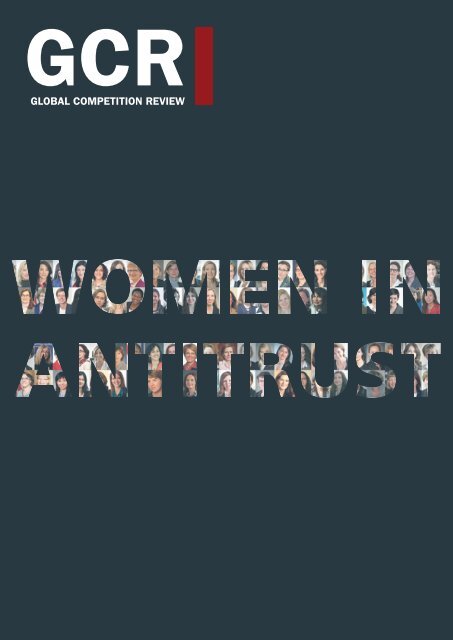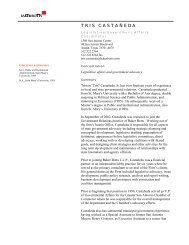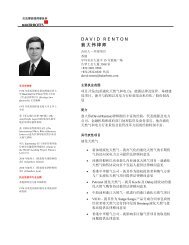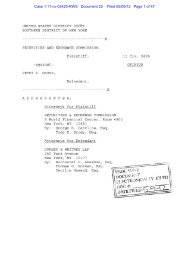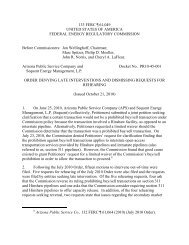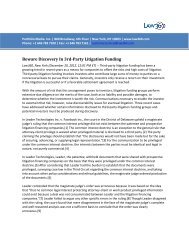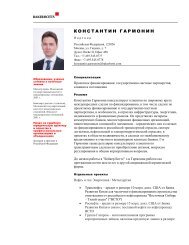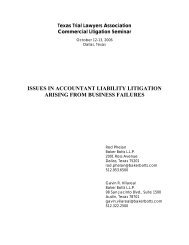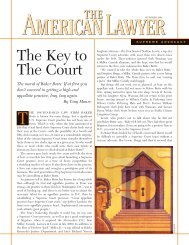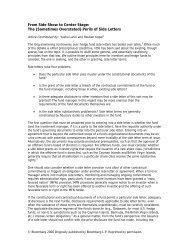here - Baker Botts LLP
here - Baker Botts LLP
here - Baker Botts LLP
- No tags were found...
Create successful ePaper yourself
Turn your PDF publications into a flip-book with our unique Google optimized e-Paper software.
GCRGLOBAL COMPETITION REVIEW
6 WOMEN IN ANTITRUSTborn out of a conscious effort to promote her own gender butbecause she found those individuals to have the “best judgmentand the most rounded experience”.Practitioners say these “trailblazers” leave an importantlegacy as role models.“Neelie Kroes, Christine Varney and Melanie Aitken willhelp to change the picture in the long term,” says DeirdreTrapp, at Freshfields Bruckhaus Deringer. “These role modelsare extremely important in breaking down some of the barrierswomen face in securing opportunities for progression.”In-house, women are also increasingly visible. SuzanneWachsstock, chief antitrust counsel at American Express, saysshe is “pleasantly surprised” by the growing number of womenin these roles. She says this is partly due to a more flexible workingstyle.“Overall, I am working even harder and more intensivelynow than I did in private practice, but am encouraged to work‘virtually’ on a regular basis, handling challenging matters fromhome,” she says. “My sense is that traditional ‘big-law’ stilltethers people to their offices in ways that continue to createchallenges for working parents.”The degree to which female antitrust lawyers still face overtor subtle discrimination is one that draws mixed responsesfrom our featured women. Things have certainly progressedfrom the time when Eleanor Fox, at New York University,started practising in the 1960s and would be told “I am sorry,we are not hiring women – we tried it once and it did not workout”. But some say women still fight against a largely unspokenexpectation that they will be less competent, or less dedicated,than their male counterparts.“T<strong>here</strong> are just some unconscious attitudes which are hardto overcome,” says Vanessa Turner, at Visa Europe. “I don’tthink we women experience much deliberate discriminationany more, but the partnership statistics in private practice arewhat they are. Clearly, some women may have other prioritiesbut this to me is not the explanation for the statistics.”Most of the female antitrust lawyers GCR spoke to still regularlyfind themselves the only woman in a client meeting roomor in a case team. But Henry says the corporate world is placingincreased emphasis on diversity, and this is having a knock-oneffect. At a recent meeting at the FTC, she says, it was a femaleclient who noted “with surprise” that all seven commission staffwere male.Margaret Zwisler at Latham & Watkins in Washington, DC,says that while antitrust litigation is still a largely male domain,corporate clients are now much more likely to entrust their“bet-your-company cases” to a female lawyer.Deborah Garza, at Covington & Burling says: “T<strong>here</strong> was atime when the ABA antitrust Spring Meeting dinner was a seaof men in blue suits. Now I see sisters (and not always in navyblue!) throughout the room, and I love it.”Sometimes, being a female antitrust practitioner can haveits advantages. Anne Federle, at Bird & Bird in Brussels, says:“I find it easier to establish a cooperative working relationshipand trust with female clients or female competition officials.T<strong>here</strong> is a sense of solidarity between women who have to jugglework and family, which can create strong bonds.”Janet Hui, at Jun He in Beijing, says a female antitrust lawyeris in a “better position” than her male counterparts. “Clientsgenerally believe that we are more careful, detailed and cautiousin preparing antitrust documentation and advice, and itis easier for us to communicate and get along with clients andrelevant parties at all levels,” she says.When asked whether antitrust still operated as a “boy’sclub”, most featured answered no, or at least that they do notpersonally feel that being female has had a negative effect ontheir career. Danish authority head Agnete Gersing says shehas “never had any trouble making [her] voice heard”. AimeeImundo at General Electric says she “always felt respected” forwhat she brought to the table. Many women say they work in a“gender blind” or “truly meritocratic” system.In younger enforcement agencies, women are frequentlyseen in top positions – the competition authorities in Pakistan,Malaysia, Egypt and Costa Rica, for example, are all headed bywomen. In Pakistan, chairperson Rahat Hassan says womenmake up 40 per cent of the agency overall. In Brazil, MarianaTavares de Araujo, at Levy & Salomão Advogados, says womenthrive in a young legal field like antitrust, w<strong>here</strong> most partnersare under 50. Half of the partners in her firm are women, andall are under 50, something she says is largely typical of firmsacross the country.It remains to be seen whether older jurisdictions are able toemulate these newer regimes and if the high number of femaleassociate numbers translates to partner level. Fiona Carlin, at<strong>Baker</strong> & McKenzie in Brussels, believes a shift is inevitable.“The pace of change is bound to accelerate in the comingyears,” she says. “I am increasingly realising that women needto overcome the fatalistic view that talent and hard work will berecognised eventually and be prepared to put themselves forwardand express their ambitions more forcefully”.The position of women in antitrust must inevitably be partof a much wider and more complex story about the place ofwomen in the broader society and economy. Whether the playingfield levels out depends on many factors – the actions ofemployers and governments, the attitude of society towardsthe roles of women and of course the calibre of the individualsthemselves. Like the rest of the female workforce, womenin antitrust sometimes struggle with under-representationand the pressures of balancing career and family life. But it isimportant to remember that these women benefit from manyadvantages above most of the female workforce; often havingthe financial means to employ outside help, and the type of jobin which working remotely is at least a possibility.Indeed, many of the women featured in the following pagesdescribe themselves as fortunate – to have been at the rightplace at the right time, and to have supportive partners andfamilies who understand that their evenings will more likelybe spent in front of an 80-page client report than a hot stove.But without doubt they are also exceptional; their inclusion inthis edition signals not only their accomplishment in an inescapablymale-dominated field, but also their skill and endeavouras partners, in-house lawyers, enforcers, economists andacademics. What is clear is that competition law benefits froma wealth of formidably successfully women, who will serve asimportant role models for both women and men following intheir footsteps.GCR Volume 16 Issue 3
WOMEN IN ANTITRUST7100 WomenThe fourth edition of Women in Antitrust profiles 100 successful women in the field of competition law. Based in jurisdictionsacross the world, our entrants were asked a series of questions about their work, developments in the field and how beinga woman has coloured their career. In larger interviews, Kristina Nordlander at Sidley Austin discusses her enterprise theWomen’s Competition Network, while Rahat Hassan, chairperson of the Competition Commission of Pakistan, speaks abouther experience as an enforcer in an emerging regime. The answers from all our entrants were at once candid, thoughtfuland humorous, and speak volumes of the joys and challenges of being a female lawyer, in-house counsel, academic,economist or enforcer in the world of antitrust. Our sincere thanks to everyone who took part.CATRIONA HATTONPartner, <strong>Baker</strong> <strong>Botts</strong>, BrusselsYears in antitrust: 23Antitrust keeps you on yourtoes. you need to work hard,understand the client’s businessand think creatively, at leastwithin the limits of lawyercreativity!I have been very privilegedto be taught by two leadingIrish women lawyers in the 1980s, both of whom wereachieving real success in their fields. They were also mothersof young children at the time and served as great role modelsfor us young women who aspired to having careers in law andfamilies at a time when this was not the norm. As it happens,they both went on to become president of Ireland: MaryRobinson was Ireland’s first woman president, succeeded byMary McAleese.As a woman, you should not think that t<strong>here</strong> arelimitations on what you can achieve only because you plan tohave a family. Most men do not think like this but many womenstill do. You may make choices in your life to work less for aperiod that can temporarily affect career progression, but theseshould be choices rather than self-limiting beliefs. Believe inyourself, work hard and enjoy what you do.GCR Volume 16 Issue 3


